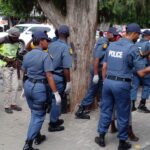Operators of public transport could lose their operating licences if they are found to have been party to extortion and racketeering activities, which are associated with violence in the industry.
“Serious attention is being given to amending conditions of all operating licences to explicitly provide for the suspension and withdrawal of operating licences in terms of section 79(2)(b) where an operator is found to have been party to extortion and racketeering activities,“ Transport Minister Fikile Mbalula said on Tuesday.
Currently the provisions of section 79(2) of the National Land Transport Act (NLTA) empowers regulatory entities to withdraw or suspend operating licences under defined circumstances.
These include the holder or employee of the holder being convicted of an offence under the Act or under a law relating to motor vehicles or the regulation of traffic or occupational safety or labour relations, or an offence due to fraud or dishonesty.
Delivering his remarks during a virtual appearance before the Portfolio Committee on Tourism, he said the intermodal conflict has worsened in recent years and goes beyond long-distance bus operators.
Reported incidents include scholar transport, cross-border transport, commuter services and commercial contract between employers and private operators.
“Extortion has become institutionalised in the public transport space, with the taxi industry being the main culprit. This provides a perverse incentive for conflict and violence. These practices are not isolated to Western and Eastern Cape but widespread across all provinces,” the Minister said.
Mbalula said government is considering a number of measures to reinforce law enforcement interventions that will stem the violence.
He said government is considering declaring a nation-wide moratorium on the issuing of all operating licences.
“A countrywide approach is important to undermine the inter-provincial nature of the extortion and racketeering activities that fuel violence and killings.”
Government is also considering implementing urgent measures to build requisite capacity for municipalities to ensure operating licences are issued on the basis of up-to-date Integrated Transport Plans as required by law.
Government is also looking at putting in place enforceable by-laws to regulate ranking facilities.
This intervention will require coordination at provincial level to ensure uniformity that can be enforced by law enforcement authorities.
“We are equally considering publishing regulations empowering the National Public Transport Regulator to establish a complaints line and monitoring mechanism for extortion and racketeering activities, which evidence will be shared with law enforcement authorities.
“This should include evidence of collusion by members of the South African Police Service (SAPS) and/or traffic officers as provided for in the National Land Transport Act Amendment Bill that is yet to be signed into law.
“These interventions are our contribution to the broader package of interventions that will be implemented through the Inter-Ministerial Committee led by Minister of Police Bheki Cele,” the Minister said.
Mbalula emphasised that the legislation that regulates public transport operations provides for a number of punitive measures for those who wilfully undermine it.
“Ours is to invoke legal instruments at our disposal to ensure that they have nowhere to hide. A tightly co-ordinated mechanism with law enforcement authorities and intelligence will deliver tangible outcomes that arrest the proliferation of this criminality,” Mbalula said.
Section 91 of the NLTA further empowers the Minister and MECs at provincial level to invoke emergency measures, which include closing of ranks and routes and impounding of vehicles where there is an outbreak of violence.
“These actions can be coordinated among different provinces. However, these measures are only effective if the identity of the perpetrators of the violence is known,” the Minister said.












